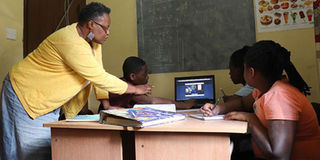Parents have crucial role in homeschooling

Celestine Lidede home-schools her children. PHOTO | COURTESY
What you need to know:
- Parents of children in the early learning years can play word games with them, teach them to read and count and also read to them.
- Parents have the opportunity to help their children to improve their literacy skills. The literate ones have found time to catch up with reading.
About 15 million children are at home following the government suspension of learning due to Covid-19.
The Ministry of Education has since set up measures to facilitate learning while learners are at home. Curriculum delivery is now enhanced through digital and broadcast learning.
Lessons are ongoing on four platforms: radio, television, YouTube and the Kenya education cloud. Obviously, the children need guidance on the same.
Kenya Publishers Association has made available approved textbooks — free of charge — on cloud in addition to the supplementary curriculum content provided by the Kenya Institute of Curriculum Development (KICD).
What is going on in homes is “homeschooling” or “home education”: education of children at home. But we should distinguish between the kind of education forced by Covid-19 from homeschooling outside public or private school systems that is common in the country.
Parents have an added responsibility in the education of children at home: they must supervise their attendance to lessons and instructions that the ministry delivers.
The children need guidance from their parents, who are also marooned in their homes. The call to supervise their children’s education may sound strange to the current generation of parents. But it is not new.
QUALITY TIME
Parents are the first teachers a child experiences. They are also the most influential to their character as everything they say or do has an enormous impression on them.
The Basic Education Curriculum Framework, the blueprint for the Competency-Based Curriculum (CBC), says children start learning even before they start school.
Indeed, nobody is more important in nurturing and protecting a child than the parent.
The responsibility will also ensure that parents, now also at home, will have quality time with their children. They will know them better through this interaction.
Parents have the opportunity to help their children to improve their literacy skills. The literate ones have found time to catch up with reading.
Leisure reading, especially, sets a good example for children as they are likely to emulate their parents.
Unquestionably, this is the time to identify exciting books or stories parents can read to or with their children.
BROADEN INTELLECT
English, the language of instruction in our school system, has a rich collection of fiction and nonfiction works.
Let parents choose from this to read to or with children when done with digital and broadcast lessons.
Parents of children in the early learning years can play word games with them, teach them to read and count and also read to them.
They can easily read with teenage children, particularly books with slightly more complex texts which challenge and broaden their intellect and mental horizons.
We have fiction and nonfiction works that illustrate the importance with enduring values. We have stories in books or stories parents remember from their childhood or student years that they can profitably share with their children.
They can light up their homes at agreed times with these stories. The formal curriculum being delivered through digital and broadcast platforms is designed to minister to whole child.
The books and stories that parents are invited to read to and with children embody these aims.
Ms Bonaya is the CAS for Education. [email protected].





